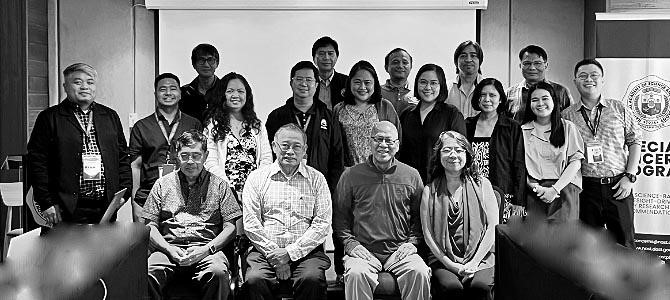Diwata, the first satellite made by Filipino scientists and engineers, ignited the interest of the whole Philippines in space science. Since the launching of the satellite in 2016, space technology has become more and more relevant to each and every Filipino through its applications to various fields, including agriculture, fisheries, and natural resources management.
As the National Academy of Science and Technology, Philippines (NAST PHL) continues its role as a primary advisory body on issues and concerns related to science, technology, and innovation, it created a Technical Working Group (TWG) to conduct in-depth studies on the use of space technology in agriculture, fisheries, and natural resources management under its Special Concerns Program in 2023.
The group is headed by Dr. Josefino C. Comiso, NAST Corresponding Member and senior scientist emeritus of the NASA Goddard Space Flight Center (GSFC), with the following members: Acd. Eufemio T. Rasco, Jr.; Acd. Rex Victor O. Cruz; Acd. Rafael D. Guerrero III; Acd. Glenn B. Gregorio; Acd. Juan M. Pulhin; Dr. Gay Jane D. Perez, deputy director general of Philippine Space Agency (PhilSA); Dr. Franz A. De Leon, director of the Department of Science and Technology (DOST)-Advanced Science and Technology Institute (ASTI); Dr. Enrico C. Paringit, executive director of the DOST-Philippine Council for Industry, Energy, and Emerging Technology Research and Development (PCIEERD); Dr. Felino P. Lansigan, retired professor of the University of the Philippines Los Baños (UPLB), and Dr. Nathaniel R. Alibuyog, professor at the College of Engineering and officer-in-charge of the Office of the Vice President for Research, Extension, and Business (OVPREB) of Mariano Marcos State University.
In August 2023, the TWG had its first workshop on the papers to be written on the uses of space technology in monitoring changes in the country’s forest cover, monitoring and forecasting farm productivity, mapping crop suitability, and monitoring coastal areas and enhancing seafood production.
The workshop participants recommended the assessment of the types of data that are directly useful for farmers, local government units (LGUs), and decision-makers, and are feasible to produce; usage of artificial intelligence (AI) and Expert Systems to accelerate the extraction of data; development of homegrown systems to provide more flexibility; building of in-house technical capacity on space technology and relevant technologies and techniques; networking and collaboration for research and decision-making.

The TWG envisions space technology as integral in the improvement of food security through precision agriculture, proper implementation of restoration projects, and protection of environment and natural resources. (Special Concerns Program Team/NAST PHL).
The National Academy of Science and Technology, Philippines (NAST PHL), an attached agency to the Department of Science and Technology (DOST), is the premier organization that recognizes achievements in science, technology, engineering, and mathematics (STEM), nurtures emerging scientific talents, and serve as the primary advisory body on national ST&I policy and related matters. For more updates, follow NAST Philippines’ (@nastphl) social media accounts.











